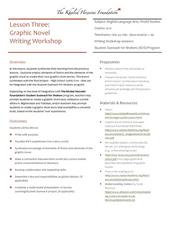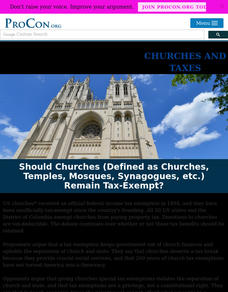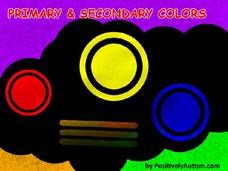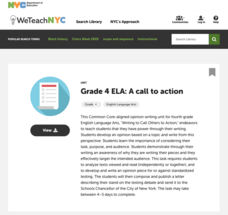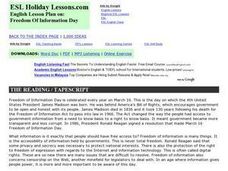Curated OER
Unforgettable...
Middle and high schoolers remember their most memorable experiences, and then connect their own narrative with an exposition about the topic associated with their experience. This New York Times lesson would be a great addition to...
Curated OER
Graphic Novel Writing Workshop
Khaled Hosseini’s video “Using Real People and Events” motivates learners to reflect on their own experiences and to use those experiences as the basis of a graphic novel that expresses a universal truth. The richly detailed plan...
Curated OER
Churches and Taxes
Churches have been tax-exempt since the founding of America, but should they be? Pupils ponder the question as they browse the website in preparation for a class debate or discussion. They research the history of tax-exemption for...
Curated OER
Expressing the Future
In thisfuture tense worksheet, students read the differences between expressing the future through present simple and present continuous verb forms.
Curated OER
Culinary Culture
Welcome to the café! Introduce beginning French speakers to food-related vocabulary and using the conditional tense to place an order. This plan gets your kids up and moving. They look at French menus, identify quantity expressions (like...
Curated OER
The Future
This teacher guide provides several ideas for how to structure a unit on the futur simple. Start by having your class read the short passage provided about Google. As they read, pupils should categorize verbs by type to highlight...
Curated OER
Cartoons for the Classroom: Fair Elections?
Rigged elections make for both intriguing current events and hilarious political cartoons. In this analysis worksheet, pupils read background information to help them grasp a cartoon about rigged presidential elections in 2007 by Russia,...
Foreign Policy Research Institute
Democracy Wall
How free are people in the United States, or in the world for that matter? The class reads and compares two articles that discuss levels of freedom enjoyed by different people around the globe. They discuss why some people have more...
Curated OER
"I Believe..." Podcast Style
Use this communication skills lesson to emphasize evaluating a speaker's main point and argument. After reading Martin Luther King's, "I Have a Dream Speech" and John F. Kennedy's speech, "I Believe in an America Where the Separation of...
Positively Autism
Primary and Secondary Colors
Red, yellow, blue. Orange, purple, green. Introduce kids to primary and secondary colors with a series of videos and a 19-slide presentation that shows how mixing primary colors produces secondary colors.
Curated OER
The Federalist Defense of Diversity: Extending the Sphere
How did early Americans ensure expansion while also securing the rights of citizens? Alexander Hamilton and James Madison, two of our early leaders, considered the problem of faction to be the "mortal disease" that created unstable...
Scholastic
Selecting Favorite Poems From Historical Poets
Here is a poetry lesson that begins with a free-association activity focused on the word voice. Learners each sit alone for a moment and make sounds that express how they are currently feeling, and then turn to their partners to share...
New York City Department of Education
Grade 4 Literacy in English Language Arts: A Call to Action
You have the power! Scholars learn that they have power of the pen in their writing. After reading and viewing various sources about standardized testing, they express their own opinions about the testing by writing letters to the...
Curated OER
War and Peace by Leo Tolstoy
Here is an online interactive reading comprehension worksheet where pupils respond to 11 short-answer and essay questions based on War and Peace. They may also access an online quiz on the selection using the link at the bottom of...
Curated OER
The Worldly Philosophers by Robert Louis Heilbroner
For this online interactive reading comprehension worksheet, students respond to 15 multiple choice questions based on The Worldly Philosophers. Students may submit their answers to be scored.
Curated OER
Reading Between the Lines: Making Inferences About Idioms
Students discover idioms. For this inferencing lesson, students identify idioms from passages and infer meanings of unknown idioms using prior knowledge and experience. Students write sentences using newly learned idioms.
Curated OER
Friendly Patter Poetry
Students create a free from poem on the topic of friendship. They read examples of free form poetry to gather ideas. Through the use of a graphic organizer, students generate a list of friendship characteristics which is used to create...
Curated OER
Freedom of Information Day
In this Freedom of Information Day worksheet, students complete activities such as reading a passage, phrase matching, fill in the blanks, correct words, multiple choice, spelling sequencing, scrambled sentences, asking questions,...
Curated OER
What If?
Second graders read WHAT IF? up to the page that ends "Suddenly, across the field they saw..." and discuss how the animals are feeling. They then discuss their feelings and in pairs discuss a possible ending to the story.
Curated OER
English Tenses and Verb Forms
If your class could use some grammar help, this worksheet could be a good addition to your lesson on verb tenses. Three exercises guide learners through the conditional tense, offering several ways to describe the results of events that...
Curated OER
Opinion
An important concept for youngsters to learn is that there is a difference between facts and opinions. Use Kirsten Hall's Animal Touch to introduce the idea that an opinion is how one feels or thinks about something and that others are...
Curated OER
"Giggle Poetry" Theater
Young scholars read and perform "Giggle Poetry Theater." In small groups, they read the poems, collect props, rehearse, and present their poem to their classmates.
Curated OER
The Hurricane
In this weather worksheet, students read a realistic story about a family's experience during a hurricane. Factual information about hurricanes is given. Students then answer 6 questions.
Prestwick House
Rhetorical Devices in Political Speeches
Have you ever watched a political speech and felt your heart beat a little faster, and your opinion either solidify or begin to slightly change? Rhetorical devices can be a strong tool in an effective and powerful speech. A short lesson...

